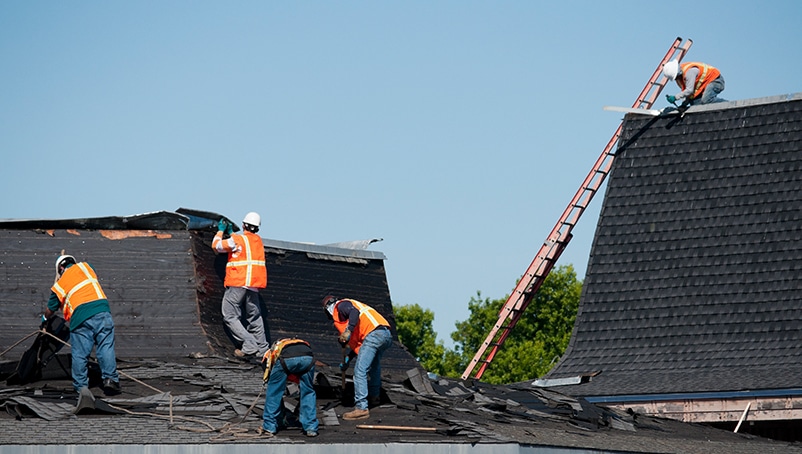How to get a Florida roofing license
Florida has two paths for getting a license for roofing:
Certified contractor — A certified contractor is licensed at the state level and can work anywhere in Florida.
Registered contractor — A registered contractor is licensed at the local level and can only perform work in a specific city or county.
Certified roofing contractor license requirements
To get a certified contractor license for roofing, you must have a combination of education and experience totaling four years. However, applicants with a four-year degree in construction must still have at least one year of on-the-job experience.
Applicants with no college credit must have at least one year of experience working as a foreman. You may qualify for an exception if you have military service.
After meeting the education and experience requirements, you must pass both parts of the Florida roofing exam. Additionally, you must fulfill the other requirements for a certified Florida roofing contractor license, including:
- Electronic fingerprints for a background check
- An official credit report from a major credit bureau with a FICO credit score
- If your FICO score is below 660, you’ll need a construction license bond or irrevocable letter of credit.
- Proof of satisfaction of any liens, judgments or bankruptcy discharge, if applicable
- Statement of financial responsibility
- Workers’ compensation that meets state requirements ($100,000 per occurrence, $500,000 aggregate, and $100,000 per disease).
- Roofing liability insurance. General and building contractors must have $300,000 for public liability and $50,000 for property damage. All other categories or employers must have $100,000 for public liability and $25,000 for property damage.
You’ll need to complete and sign the application with the applicable licensing fee, which is $149 or $249, depending on the time of year you submit your application.
Registered roofing contractor license requirements
Contractors with a registered license can only work in a specified local area and must meet the competency requirements established in that city or town.
To qualify for a registered license, contractors must obtain a certificate of competency from a local licensing authority. Roofers with a registered license do not need to meet the state education or experience requirements, and they don’t need to pass the state roofing exam.
However, they must meet all other requirements, including credit scores, proof of financial responsibility and proper business insurance coverage. The applicable fees are $209 or $309 depending on when your application is submitted.
How long does it take to get a roofing license in Florida?
Roofers should expect the application process to take two to three months, not including the required educational and on-the-job experience.
Here’s the estimated timeline you can expect:
- Study for and take the Florida roofing license exam or other required exams (4-6 weeks).
- Gather necessary paperwork, proof of experience and documentation (1-2 weeks).
- Get fingerprinted at an approved Livescan Service Provider at least five days before applying.
- Apply and get an appointment for a board review meeting (2-4 weeks).
- Prepare for a board review meeting. Notice is mailed two weeks before the meeting.
- Upon approval from the board, the license is issued, typically two weeks after the board meeting.
While Florida doesn’t have many ways to fast track this process, one thing you can do to avoid delays is to make sure you understand the process and meet all requirements before applying. Issues that could slow down your application include:
Poor credit history: The fastest way to meet Florida’s financial responsibility requirements is to show proof of good credit history with a 660 FICO credit score or above. Scores below 660 will require an irrevocable letter of credit from a bank, and some applicants may need to complete a 14-hour financial responsibility course.
Failure to pass the roofing license exam: The application process cannot be started until you have received passing scores on your state or local exam. If you fail the state exam, you must wait 21 days to try the test again.
Not meeting insurance requirements: In Florida, roofers have multiple insurance requirements with different minimum policy limits. Without the proper types and amounts of insurance, your application for a license will be delayed until you get the right amount of coverage.
Previous criminal record: While this is not an automatic denial, you must complete additional paperwork outlining your criminal history, which can slow down the review of your application.
Applying for a registered license instead of a certified license may also speed up the process. Since each local licensing authority sets its requirements and the state licensing exam is not required, some roofing contractors may be able to get a license faster through the registered license application process. However, it will limit your business to one area which may not be desirable.






